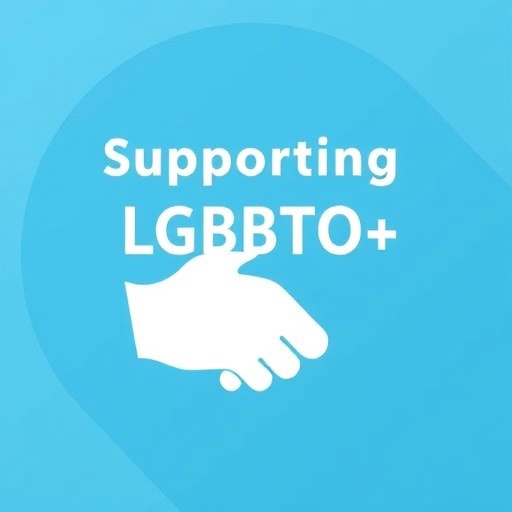Recent insights into the vulnerabilities faced by LGBTQ+ youth have placed a spotlight on the urgent need for effective suicide prevention strategies within K-12 school environments. A groundbreaking scoping review titled “Affirm My Identity, Save My Life,” conducted by Stilwell, Scott, Murphy, and colleagues, critically examines the landscape of existing efforts aimed at safeguarding the mental health and well-being of these at-risk adolescents. As societal acceptance evolves, so too must the frameworks that support the diverse identities of all students, making this review essential reading for educators, policymakers, and mental health professionals alike.
Historically, educational institutions have grappled with creating inclusive environments for LGBTQ+ youth, often leaving these students feeling marginalized and unsupported. The scoping review sheds light on the significant risk factors associated with mental health issues and suicidal ideation among LGBTQ+ individuals, emphasizing the need for comprehensive strategies that not only address these challenges but actively promote affirming environments. By highlighting successful programs and practices, the review acts as both a call to action and a roadmap for future initiatives that prioritize the mental health of these young people.
As the mental health crisis among youth continues to escalate, the intersectionality of identity becomes increasingly important. The review draws on various studies to illustrate how factors such as race, socioeconomic status, and geographic location intersect with sexual orientation and gender identity, compounding the challenges faced by LGBTQ+ youths. This multifaceted approach ensures that solutions are not one-size-fits-all but are tailored to meet the diverse needs of the student population.
Moreover, the review delves into the role that positive school climates play in fostering a sense of belonging among LGBTQ+ students. Education professionals are encouraged to cultivate environments where all identities are celebrated and validated. This includes implementing anti-bullying policies that explicitly protect LGBTQ+ students, as well as professional development for educators that focuses on cultural competency and inclusive practices. Such initiatives not only improve student morale but also significantly reduce instances of bullying and discrimination, which are common precursors to mental health crises.
A key finding of the scoping review is the effectiveness of peer support programs in schools. These programs empower students to advocate for one another and provide a safe space for sharing experiences and challenges. By engaging students as allies, schools can harness the power of peer relationships to reinforce affirming messages and combat feelings of isolation that many LGBTQ+ youths face. The review highlights several successful peer-led initiatives that have resulted in improved mental health outcomes, thereby emphasizing the importance of student engagement in suicide prevention efforts.
In addition to peer support, the review discusses the importance of mental health resources tailored specifically for LGBTQ+ youth. School counselors and mental health professionals are urged to familiarize themselves with the unique challenges faced by these students, ensuring that they receive appropriate services. The integration of LGBTQ+-affirming practices into existing mental health frameworks is vital to creating a comprehensive support system that meets the needs of every student.
Furthermore, the study advocates for the involvement of families in the suicide prevention dialogue. By providing resources and support to parents and guardians, schools can create a more cohesive network of understanding and acceptance. Bridging gaps between home and school is paramount; it allows for a more integrated approach to mental health support, as families play a critical role in shaping a young person’s identity and self-acceptance.
Legislative support also figures prominently in the review, with calls for policies that explicitly address the needs of LGBTQ+ students. Advocates argue that systemic changes at the educational and legislative levels are necessary to ensure that the rights and well-being of LGBTQ+ youths are prioritized. This includes comprehensive anti-discrimination laws and funding for mental health resources specifically aimed at supporting LGBTQ+ populations within schools.
The implications of the scoping review extend to broader societal attitudes towards LGBTQ+ individuals. As schools frequently reflect societal norms, the environment within educational institutions can significantly influence younger generations’ perceptions of sexual and gender diversity. By fostering understanding and acceptance within school settings, educators play a pivotal role in molding future societal attitudes toward LGBTQ+ individuals.
In conclusion, the scoping review “Affirm My Identity, Save My Life” serves as a crucial resource for understanding and addressing the mental health challenges faced by LGBTQ+ youth in K-12 schools. By synthesizing existing research and highlighting best practices, the authors provide a comprehensive overview of the necessary components for effective suicide prevention efforts in educational settings. As we continue to confront the pressing issues of mental health and suicide among young people, it is imperative that educational institutions take actionable steps to create supportive, inclusive, and affirming environments for all students, regardless of their identities.
The insights presented in this review not only underline the importance of supportive school policies and practices for LGBTQ+ youths but also advocate for systemic changes that can lead to a brighter future for this vulnerable population. By committing to these efforts, educators and policymakers can play a significant part in reducing suicide rates and fostering a climate of acceptance and belonging in schools across the globe.
Subject of Research: Suicide Prevention Efforts for LGBTQ+ Youth in K-12 Schools
Article Title: Affirm My Identity, Save My Life: A Scoping Review of Suicide Prevention Efforts for LGBTQ + Youth in K-12 Schools
Article References:
Stilwell, S.M., Scott, B.A., Murphy, H. et al. Affirm My Identity, Save My Life: A Scoping Review of Suicide Prevention Efforts for LGBTQ + Youth in K-12 Schools.
School Mental Health (2025). https://doi.org/10.1007/s12310-025-09797-4
Image Credits: AI Generated
DOI: 10.1007/s12310-025-09797-4
Keywords: LGBTQ+ youth, suicide prevention, mental health, K-12 education, inclusive environments, school policies, peer support, legislative support.




